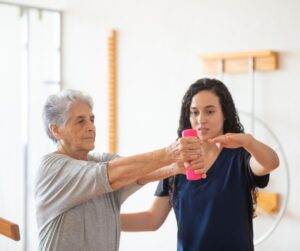Ryan Miller, Senior Care Partners P.A.C.E.
This month I sat down with Shelly Nutter to discuss Care for the Caregivers. Shelly is the Area Vice President for Fresh Perspective Home Care LLC and co-owner of Espanola House AFC. Often the conversations revolving around healthcare focus on the patient – their needs, their diagnosis, their plan of care. Today we turn our focus to the caregivers in patients’ lives. Shelly shares her perspective to my questions in this month’s edition of Keeping PACE.
Ryan: What advice would you give someone who is providing regular care for an elderly family member or friend?
Shelly: First, I would like to thank them. Our communities are suffering severe shortages of caregivers. I would remind them about self-care and of burnout. Recommend they have a backup plan if they become unable to provide care and a future plan if needs increase. Know what options are available (before you’re in a crisis) and take the time to learn/educate about caregiving, your loved ones needs or condition, and what to anticipate over time.
Ryan: The role of caregiver can look different for each person. Sometimes a person might not even realize that they are a caregiver because they aren’t providing medical treatment. What are some of the most common examples of the type of care that someone might be providing?
Shelly: Daily housekeeping, meal preparations, grocery shopping/errands, ambulation/mobility assistance, transfers, bathing, dressing, grooming, toileting/incontinence care, medication reminders, safety monitoring, and companionship/socialization.
Ryan: Many of those sound like examples of helping out, being a friend, or “you do for family”. It’s good to hear you share a list like that so that others can acknowledge the importance of their role and that they are a caregiver.
Ryan: How can a caregiver reduce burnout, fatigue, and frustration?
Shelly: Planning ahead/being prepared, self-care, using additional support/help for respite, access training to become a proficient caregiver, and look for resources to help become part of a care team for your loved one.
Ryan: Can you explain what respite care is?
Shelly: Respite care is when another person (caregiver) or place (facility) provides care for the primary caregiver (usually a family member) on a temporary basis or as a part of the total plan of care. For examples, if a son is caring for his mother daily and he needs time to take a break (health reasons, vacation, etc), he may use respite care at a long-term care (LTC) facility for two weeks. This gives him a break and ensures his mother is still being cared for. Another example could be if the son works and needs another caregiver to come to their home to provide respite care on the days he is at work. Respite care gives the primary caregiver a break whether in the home, regularly or periodically, or out of the home for a specified amount of time. This is a great support to include as part of a care team when an informal caregiver (family or friend, unpaid) is providing care for a loved one.
Ryan: What types of resources are available for caregivers?
Shelly: There are many types of support groups available. I would also encourage people to find and community resources that may be able to provide respite care to give you a break. Caregivers can also partner with a reliable home care agency for extra help, training, backups, recommendations, etc.
Ryan: Unfortunately, I think our pride gets in the way of asking for help. That and feeling like we don’t have time to do the research or for another meeting. We all need to be more willing to ask for help, accept help, and learn from others who may have gone through similar experiences as we are going through. We have a long way to go, but I do feel that as a society we have started to make strides in reducing stigmas surrounding asking for help and acknowledging our limitations. Asking for help, participating in support groups, and engaging in mental health services are not signs of weakness. In my opinion, those are people demonstrating an enormous amount of bravery and strength.
Ryan: We have looked at caregiver needs from the perspective of a family member or friend being the caregiver. What about those who’s paid job is that of a caregiver? What challenges do they face that we might not always consider?
Shelly: While being a caregiver can be fulfilling and a rewarding job, it can also be stressful. Home Care agencies typically provide initial training and on-going training to support caregivers. Oftentimes paid caregivers are often also unpaid caregivers for others in their family or friend group as well. It can be challenging defining boundaries in caregiving as a paid caregiver versus the role or responsibility as an informal caregiver. We often find ourselves in the middle of some challenging family dynamics that can create mixed information or expectations, additional stress, barricades to quality care, unsafe situations, etc.
Ryan: I’m sure you’ve seen cases in which a family member, perhaps a spouse or child, is providing regular care for a loved one when circumstances change, and the caregiver now finds themselves in need of help. What would you recommend that person does?
Shelly: Plan ahead. Gather information about resources, Home Care agencies or other continual care options (AIM program, hospice, PT/OT, or transitions to LTC facility). I encourage people to learn about expected progressions in aging or declines in health to best anticipate increased needs. It is never to early to start building a care team to help. A care team can consist of different kinds of help from advocacy, caregiving, support, resources, physical therapy, occupational therapy, hospice and others. We all need to have those tough and uncomfortable conversations about decision making for future care, advanced directives, finances, quality of life, Power of Attorney (POA) and more.
Thank you to Shelly Nutter for sharing her fresh perspective on providing Care for the Caregivers. I also want to thank both the informal and the paid caregivers in our community. I know that it may not feel this way, but you are important, you are valued, you are appreciated, and you are loved. Please do not forget to make your physical, mental, and emotional health a priority even while you care for others.







